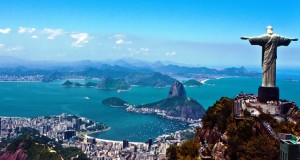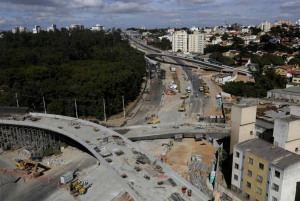By Carrie Mittl

Celebration on Copacabana Beach after Brazil was awarded the 2016 Olympics (Source: Lalo de Almeida, New York Times)
Rio de Janeiro, the sixth largest city in the Americas and the second most populous municipality in Brazil, “combines the rich sounds of Samba and a thriving nightlife to give…it [a] reputation as one of the most striking [cities] in the world.” [1] Situated on the Atlantic Ocean, the Marvelous City, or the Cidade Maravihosa to Brazilians, weaves throughout busy city streets, rainforests, and mountain ranges[2]. Travelers would witness juxtapositions of poverty and modernity as they travel the streets. Some of the most famous icons of the city include the Copacabana beach, the statue of Christ the Redeemer, and the Sugarloaf Mountains.[3]
When Brazil won the bid the for the 2016 Olympics in October of 2009, thousands of Brazilians swarmed Copacabana beach in celebration. The efforts by President Luiz Inacio Lula de Silva and the Brazil’s Olympic Committee had finally paid off[4]. They had previously won the bid for the 2014 World Cup in 2007, so the country, being the first South American country to host the Olympics, had evidence of its growing international influence.

View from Hilton Barra Rio de Janeiro Hotel, Brazil with Christ the Redeemer Statue (Source: Hilton Hotels and Resorts)
The committee that fought for the Brazilian bid had many solid arguments for as to why Rio de Janeiro should host. One of the most important is its affinity for sports. Brazil has strong connections to NASCAR, volleyball, and its most popular, soccer, and the weather for outdoor sports is beautiful. In addition, the country successfully hosted the Pan American games in 1963 and 2007, providing evidence for its commitment to international sports.[5] Carlos Roberto Osorio, secretary general of the Brazilian Olympic Committee, believed that Brazil has learned to integrate large-scale events with the government and public sector, which contributed to the successful execution of the Pan American events.[6]
“What made the difference [this time] was, first, experience — because we have bid before and we have organized large-scale events before. Add to that the special circumstances that Brazil is living now: It is a country that is stable and strong economically, with great prospects for the future and the critical mass [necessary] to host the games. So, I think the combination of gained experience and these special circumstances won the bid.” ~ Carlos Roberto Osorio
One of their most fundamental arguments was that the Games would be a platform for social integration and prosperity. Osorio noted that the Committee was not trying to hide the social inequality and problems their country has faced. They, instead, used this fact to argue that the Olympics would “leverage [social] programs that already exist,… foster integration within the society, and … raise a younger generation to a better standard of living.”[7] Also, the country seemed to shrug off the global financial crisis and stormed ahead to win the 2014 World Cup bid in 2007. Their relative economic stability among the global chaos made Brazil and even more promising candidate.[8]
President Lula also learned from past successful bids the importance of physically attending the presentation to the Olympics Committee. Russian President Vladimir Putin walked away from the Olympic Committee in Guatemala in 2005 with the 2014 Winter Olympics. Similarly, British Prime Minister Tony Blair travelled to Copenhagen to fight for Great Britain and came back with the 2012 Summer Olympics in London.[9] So when he fought in person for Brazil’s bid in Copenhagen in 2007, the physical presence of the country’s leaders seemed to help propel the Brazilian bid forwards.

Bridge collapse in July 2014 after it was rushed to be completed in time for the World Cup (Source: AP Images)
Despite the excitements and hopeful promises leading up to the Olympics, Brazil had to first successfully hold the 2014 World Cup. This major soccer tournament exposed some of Brazil’s greatest weaknesses as a country. Around 250,000 Brazilians were evicted from their homes.[10] The $22,000 was no where near enough compensation for these families. Some experts say that holding the World Cup and Olympics were just an excuse to clear out the Brazilian slums.[11] Furthermore, the country was left with huge debt. The games cost $12 billion, leaving several Brazilians wishing that the money had been spent on more important sectors of the society like health care and education. Since many construction projects were rushed so that they would be complete in time for the World Cup, Brazil also faced infrastructure problems, including a bridge collapse, killing two people.[12] Also 10 of the 56 promised infrastructure projects were finished in time for the World Cup.[13]
Brazil was left with unresolved questions after the World Cup in 2014. Now the country heads into the 2016 Olympics with several parts of their society in chaos. Check out the other pages to explore how the economic, health, and political issues in Brazil will affect the games.
Links
Notes
[1] “Rio de Janiero,” Brazil Travel Information, http://www.braziltravelinformation.com/brazil_riodejaneiro.htm.
[2] Ibid.
[3] Ibid.
[4] Eduardo Gomez, “Foreign Policy: Why Brazil Won the 2016 Olympics,” NPR, October 5 2009, http://www.npr.org/templates/story/story.php?storyId=113493385.
[5] Ibid.
[6] “Brazil’s Goal: How Rio Won It’s Olympic Bid,” Wharton: University of Pennsylvania, March 3 2010, http://knowledge.wharton.upenn.edu/article/brazils-gold-how-rio-won-its-olympic-bid/.
[7] Ibid.
[8] Ibid.
[9] Eduardo Gomez. “Foreign Policy.”
[10] Sarah Kaufman, “7 Big Problems the World Cup Left Behind in Brazil,” World.Mic, July 17 2014, http://mic.com/articles/93814/7-big-problems-the-world-cup-left-behind-in-brazil#.UBuMBSaxY.
[11] Ibid.
[12] Ibid.
[13] Ibid.
~761 words~
How to cite this article: “Is Rio Ready?” Written by Carrie Mittl and Sam Shapiro, Olympic Football 2016 Guide, Soccer Politics Blog, Duke University, http://sites.duke.edu/wcwp/tournament-guides/olympic-football-2016-guide/is-rio-ready/uswnt-focus/, (accessed on (date)).
